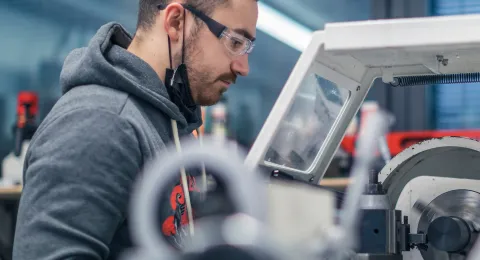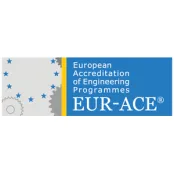
Master's Programme in Mechanical Engineering


The programme is accredited by international EUR-ACE® and ASIIN standards for high quality degree programmes in engineering.
Machines have enabled many imposing and magnificent ideas and have facilitated a multitude of challenging functions. Machine science and its traditional findings form the basis for other engineering sciences.
Machine science is characterised by a strong desire to think differently and effect change in the world.
The Master's Programme in Mechanical Engineering offers several unique multi-disciplinary specialisation packages, such as digital engineering, hybrid materials and steel structures, which support traditional mechanical engineering. You will be studying in well-equipped facilities, and many of your classes will take place in high-tech labs that enable computer modelling, 3D imaging, and virtual reality for conducting experiments.
The programme provides you with great opportunities to build your own personal study plan by freely selecting two of six available specialisation packages and some elective courses.
You will build your own study plan from the following specialisations:
- digital engineering
- robotics and mechatronics
- welding technology and laser processing
- steel structures
- composites and hybrid materials
- sustainable manufacturing processes.
This programme gives you unique knowledge, skills and competences in mechanical engineering and leadership and management skills required in industrial positions.
Who is this programme for?
This programme is for you if you aspire to impact climate change, sustainable development, and resource conservation by developing innovative products or technologies as a mechanical engineer. Gain versatile skills in creative problem-solving, product design and manufacturing, and project management, opening many paths to a career in engineering. You will graduate with the tools to impact everyday life in fields such as aerospace, the automotive industry, energy systems, structural design, materials science, or robotics and automation.
In addition, you have:
- a bachelor’s degree in mechanical engineering;
- a strong foundation in mathematics and physics (mechanics, thermodynamics, materials science, and chemical processes);
- a critical and analytical mindset for designing and troubleshooting systems;
- good communication and teamwork skills;
- a minimum arithmetic GPA of 3.25 on a scale of 1.00–5.00;
- certified English language skills;
- familiarity with computer-aided design (CAD) and software programming as well as practical experience from laboratories, internships, or projects in the field of mechanical engineering.
What will you learn in the programme?
As a graduate of this programme, you will understand the applications of mechanical engineering in different specialisation areas and know how to combine them to form multidisciplinary knowledge, skills and competences.
You will acquire:
- competence to think through industrial research and development problems logically and solve them to contribute to critical and innovative thinking in different areas of mechanical engineering;
- professional skills that enable you to understand the needs and special features in mechanical engineering design, IoT, automatised and robotised production and manufacture of products, material selection and modelling and reliability-based design, and business-oriented project work; you will learn to utilise fully digitised design, simulation and production environments for different areas of mechanical engineering including sustainability aspects;
- multidisciplinary teamwork skills that enable you to participate and interact in task-orientated engineering groups in a productive manner and lead and manage design projects.
Degree structure and studies
The Master's Programme in Mechanical Engineering is a two-year programme. It leads to the degree of Master of Science in Technology, M.Sc. (Tech.), which is 120 ECTS credits.
The programme includes core, advanced specialisation and elective studies as well as a Master's thesis. Read more in this academic year’s curriculum.
Quality of education
The high quality of education is one of the most important principles on which we will not compromise. International programme accreditations ensure the continuous development of our education and the international recognition of the degrees of our graduates. LUT University was one of the world’s top 300 universities in the THE World University Rankings 2024, which is one of the most highly regarded university ranking systems.
The systematic quality assurance procedures that we have developed over a long period guarantee the high quality of our degree programmes and the strong competence of our graduates in the future labour market. The underpinning elements of our education quality are the contents of our degree programmes, which are based on innovations of scientific research and the needs of the working world, and active student–teacher interaction. We evaluate the quality of our education through several follow-up procedures and feedback channels (e.g., course feedback, graduate feedback, alumni feedback, thesis commissioners’ feedback).
Career prospects
The programme offers graduates excellent career prospects in a broad field of mechanical engineering-related industries and provides an excellent foundation for those wishing to undertake doctoral studies.
The programme aims to give to students both strong professional know-how in mechanical engineering and good leadership and management skills for industrial positions.
Graduates typically build careers as e.g.
- design managers
- production managers
- experts in a specific area of mechanical engineering
- researchers or scientists
- project managers.


